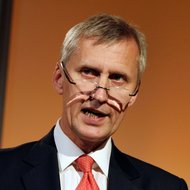 Simon Newman/ReutersMartin Wheatley, managing director of the Financial Services Authority, is expected to outline the findings of a review of Libor on Friday.
Simon Newman/ReutersMartin Wheatley, managing director of the Financial Services Authority, is expected to outline the findings of a review of Libor on Friday.
LONDON — A British banking group is preparing to give up its control over the interest rate at the center of a recent manipulation scandal, according to a person with direct knowledge of the matter.
The move may pave the way for British authorities to become more directly involved in overseeing the London interbank offered rate, or Libor, a benchmark that underpins more than $360 trillion of financial products worldwide, including mortgages and other loans.
Regulators may also make it a criminal offense to manipulate the rate.
Despite the rate’s central role in many financial transactions, authorities around the world do not regulate Libor. Still, any changes to the rate-setting system are likely to be phased in over several years.
The shift away from the trade group that controls the rate, the British Bankers’ Association — whose members include many of the world’s largest banks — is expected to be announced on Friday, said this person, who spoke on condition of anonymity because he was not authorized to speak publicly. That is when Martin Wheatley, managing director of the Financial Services Authority, the British regulator, will outline the findings of a review of Libor that was ordered by the British government.
Libor Explained
“The existing structure and governance of Libor is no longer fit for purpose, and reform is needed,” Mr. Wheatley said when the Libor review was announced in August. “Trust in a vital part of the financial system has been badly damaged, and timely action is needed to restore it.”
On Tuesday, a spokesman for the Financial Services Authority of Britain declined to comment.
But in a brief statement, the British Bankers’ Association appeared to point to the coming changes, saying that it would work with government authorities.
“If Mr. Wheatley’s recommendations include a change of responsibility for Libor, the B.B.A. will support that,” the organization said. A spokesman for the group declined to comment.
The overhaul of Libor comes after Barclays agreed to pay American and British regulators $450 million in June to settle accusations that some of its traders had manipulated the rate for financial gain.
Senior executives at the bank were also suspected of lowballing the rate to protect Barclays’ reputation during the recent financial crisis.
In the wake of the scandal, the bank’s American chief executive, Robert E. Diamond Jr., who denied asking colleagues to submit artificially low Libor rates, and its chairman, Marcus Agius, resigned.
Some of Barclays’ traders may still face criminal prosecution over their role in the manipulation of Libor. And other banks, including UBS and Citigroup, are under investigation in a number of jurisdictions about the potential manipulation of the rate.
Removing the British Bankers’ Association from its role of setting Libor would be a blow to the organization, which established the rate in 1986. The rate system was created to give its members a uniform global benchmark to price different types of loans. (There are 150 different Libor rates, covering 10 currencies and 15 maturities.) The rise in Libor’s popularity coincided with rapid growth in global money flows and the creation of new financial products — with London as a crucial hub.
Under the group’s current system, some banks are polled each day by the data provider Thomson Reuters about what interest rate they would pay if they had to borrow money from the capital markets. In the case of the United States dollar Libor rate, the four highest and four lowest submissions are thrown out, and Thomson Reuters averages the remaining ones.
Complaints about possible manipulation of Libor date back to at least 2007, according to regulatory filings released in the aftermath of the Barclays settlement.
In 2008, the Federal Reserve Bank of New York and the Bank of England called for changes to the rate-setting process, according to those documents. But authorities balked at taking a more hands-on approach, according to e-mails released this summer by the British central bank.
The report of an expected overhaul of Libor came a day after Gary Gensler, chairman of the Commodity Futures Trading Commission in the United States, suggested that authorities should rework or replace the interest rate.
Speaking to the European Parliament on Monday in remarks relayed from Washington, Mr. Gensler said that Libor was still vulnerable to manipulation. As banks continued not to lend to each other, the lack of real transactions underpinning the rate left it open to tampering, he added.
“It is time for a new or revised benchmark — a healthy benchmark anchored in actual, observable market transactions — to restore the confidence of people around the globe that the rates at which they borrow and lend money and hedge interest rates are set honestly and transparently,” Mr. Gensler said.
Article source: http://dealbook.nytimes.com/2012/09/25/british-bankers-group-seen-losing-control-over-libor/?partner=rss&emc=rss